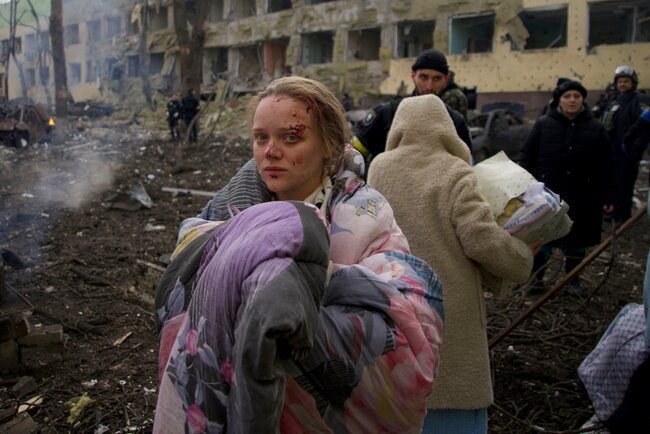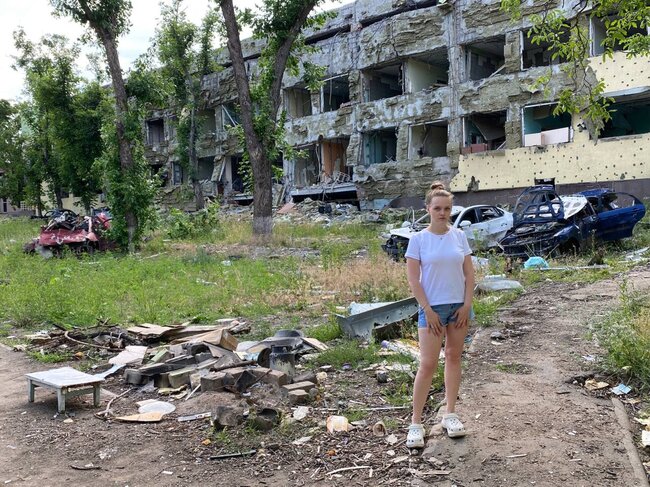Manage episode 520378196 series 3381925
In March 2022, Ukrainian beauty blogger Marianna Vyshemirskaya was photographed by Associated Press journalists Mstyslav Chernov and Yevgeny Maloletka as they documented the aftermath of a Russian strike on a maternity hospital in Mariupol. The photographers’ shots of her became some of the most widely shared and resonant images of Moscow’s assault on the city. After leaving Mariupol, however, Vyshemirskaya gradually embraced the Kremlin’s narrative of the war, forging ties with influential Russian political operators and becoming a vocal critic of Ukrainian President Volodymyr Zelensky. Journalists from Novaya Gazeta Europe investigated how Vyshemirskaya and other bloggers from Mariupol became entangled in Russia’s propaganda networks. Meduza summarizes their findings below.
Marianna Vyshemirskaya (who also goes by her maiden name, Podgurskaya) first made headlines during the Russian military’s siege of Mariupol, when she was featured in an Associated Press report on the bombing of the Mariupol maternity hospital on March 9, 2022. Photos of her pregnant with blood on her face quickly spread across social media and news outlets. She gave birth to a baby girl the day after the attack.
The hospital strike killed three people and injured 17. Russian propagandists, meanwhile, insisted the attack never occurred, alleging it was staged by Ukraine and that Vyshemirskaya was an actress. Pro-Kremlin Telegram channels published an interview with her as supposed “proof” of Moscow’s version of events. Vyshemirskaya expressed anger that her photos had been taken and used without her consent, but she did not deny the hospital strike, saying only that she didn’t know which side was responsible.
Before Russia’s full-scale invasion, Vyshemirskaya was a beauty influencer with more than 80,000 Instagram followers. Today, her account is private and all posts have been deleted, according to Novaya Gazeta Europe. After evacuating from Mariupol, she launched a Telegram channel — this time focused not on makeup but on the war.
There, she chronicled her move to occupied Donetsk and the city’s bombardment, her trips back to Mariupol, as well as Moscow’s reconstruction efforts there. She accused the Ukrainian authorities of abandoning ordinary people and dragging them into a “fratricidal war.” She weighed in on international affairs, promoted Telegram channels run by Russian propagandists, and even sent drones to Russian troops. Ahead of Russia’s 2024 presidential election, she publicly endorsed Vladimir Putin and later congratulated him on his victory. She now appears to live in Moscow.


According to Novaya Gazeta Europe, Alexander Torshin — former deputy chairman of Russia’s Federation Council and Central Bank — played a pivotal role in Vyshemirskaya’s transformation from beauty blogger to political commentator. Torshin gained international notoriety in 2018, after U.S. authorities accused 29-year-old Russian national Maria Butina of acting as an unregistered foreign agent in the country and sentenced her to 18 months in prison. After returning to Russia, she became a State Duma deputy and prominent propagandist. Journalists have described Torshin as her patron during her time in the U.S., helping her cultivate ties with American conservatives and receiving updates on her activities.
Vyshemirskaya first mentioned Torshin on her Telegram channel in fall 2022, claiming he had sent medicine to people in need in Donetsk. She later spoke openly about collaborating with him and even wished him a happy birthday. Her channel also frequently referenced a figure named Oleg Khusnullin, whom she alternately described as a representative of the self-proclaimed Luhansk People’s Republic’s mufti in Moscow; an adviser to the head of Russia’s Chuvash Republic and his envoy in Berdyansk; and the government relations director at the construction firm House Group.
Novaya Gazeta Europe found no trace of a person with Oleg Khusnullin’s purported name and birth date in any major leaks of Russian personal data. Because no phone number, vehicle, or apartment appeared to be registered to him, the outlet suggests he may have used other names in the past and that parts of his public biography may be fabricated.
From 2022
Khusnullin has called Torshin his “friend and mentor” and referred to Vyshemirskaya as a “colleague on humanitarian projects.”
Novaya Gazeta Europe also obtained information on Vyshemirskaya’s income over the past three years and found she received a salary from House Group — where Khusnullin was reportedly the governor relations director — as well as from two other companies for which Khusnullin has reportedly lobbied in Russian-occupied Ukraine.
Vyshemirskaya stopped posting on social media at the end of 2024. Neither she nor Torshin nor Khusnullin responded to Novaya Gazeta Europe’s requests for comment.
Vyshemirskaya is not the only Ukrainian who remained in the occupied territories after 2022 and began amplifying Russian propaganda. Twenty-three-year-old Maria Chushikina runs a blog called Masha from Mariupol, where she highlights Russian-led reconstruction efforts without mentioning that it was Russia that destroyed the city in the first place. As Novaya Gazeta Europe noted, her videos became noticeably more professional in late 2024, and her viewership increased tenfold. She began saying she produced videos for a media project called Telega Online, which a former employee said is overseen and funded by the state-backed Internet Development Institute (IRI).
Chushikina’s husband, Ivan Chushikin, was a pro-Ukrainian activist before Russia’s full-scale invasion. Now he runs a Telegram channel called “Strength in Truth — Mariupol,” where he mocks President Zelensky.
Other bloggers praising life in occupied Mariupol include Anastasia Kozhevnikova, formerly a travel vlogger who now films trips to Crimea; Igor Korzhov, who constantly insists conditions in the city are improving; and Vasilisa Belyakova, who left for Germany after the invasion but later returned and now posts videos explaining why Mariupol is “better than Germany.” “This city was wiped out in a matter of months. Many here lost their children, loved ones, neighbors. That pain will never leave this city,” Belyakova told Novaya Gazeta Europe. “Of course, many people criticize me, but others understand that I came back home. I have no other home.”
Russia’s new propaganda channel in Kyrgyzstan
At the Novaya Gazeta’s request, Benjamin Schultz, a disinformation researcher at the American Sunlight Project, analyzed posts from bloggers in Mariupol and Donetsk. He found that many of them discuss identical themes in nearly identical language, suggesting coordination. Novaya Gazeta Europe found no direct evidence of government funding. But the bloggers’ output may be shaped primarily through coercion, according to former Mariupol mayoral adviser Petro Andryushchenko.
“There is no way — and there never could be — that a blogger could remain independent without someone showing up in the first month of their rise and ‘explaining the rules,’ so to speak,” said Andryushchenko, who now heads the NGO Center for the Study of Occupation.
Sergey Polyakov, a disinformation researcher at the University of Amsterdam who also reviewed the bloggers’ content, believes their goal is to help Russian propagandists portray Mariupol as better “under Russia” than it was “under Ukraine.” “It’s like [Moscow Mayor Sergey] Sobyanin-era Moscow — a showcase of stability and comfortable living amid a country at war. Except imagine it built atop bombed-out residential blocks, with former residents buried in the courtyards,” Polyakov said.
64 episodes



